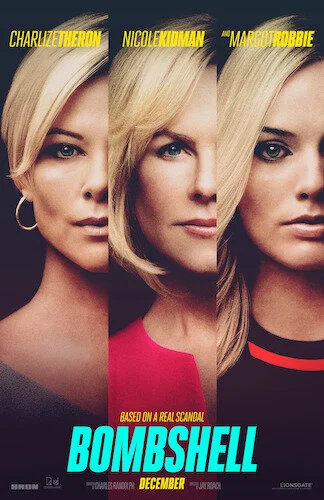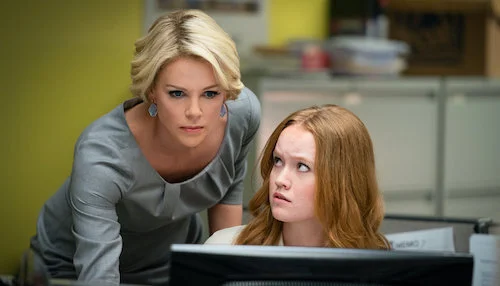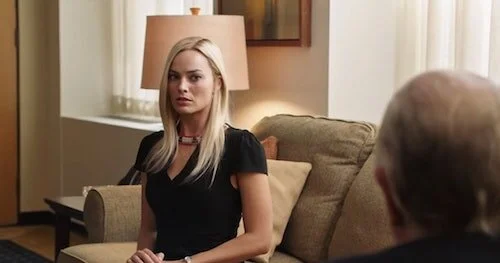Bombshell
So, these docudramas that break the fourth wall are definitely in fashion, and the latest iteration is now Jay Roach’s Bombshell (the wall doesn’t even exist at this point). He is joined by screenwriter Charles Randolph, one half of the Academy Award winning duo for The Big Short. Considering Randolph worked with Adam McKay, you’d imagine Bombshell would carry maybe a more satirical approach; this is because McKay and Roach have both followed very similar career paths, having started out with comedic films and subsequently branching out towards political statements. Bombshell is definitely sharp, but it is a much more serious effort by both Roach and Randolph, likely to not discredit the very serious topic at hand.
The characters that interact with the audience are much less frequent here than in other similar films (in fact, it’s just Gretchen Carlson that addresses us two brief times). The frantic editing of these films is now made into more of an illusionary blur, as to make the real and the filmed blend into one another; this includes digital integration of performers into real footage, or quick pans to assimilate sets into real events. If anything, Bombshell addresses this focus early on with a title card stating that both real and dramatized events coexist here; whatever looks real likely is real. Of course, Bombshell is known for its inaccuracies, but the cinematic merge is quite smooth.
Megyn Kelly’s social status during the 2016 presidential elections plays a major role in the events happening at Fox headquarters.
I almost labeled this film as an acting vehicle, but it’s hard to think that way when Randolph’s writing is so on point (for the most part). The dialogue is as quick witted as ever. The placement of the segments for the three main storylines (Megyn Kelly, Gretchen Carlson, and ficticious character Kayla Pospisil) is cleverly calculated, with the ongoing social miasma within the Fox News headquarters bouncing off of each perspective effectively. Roach does a better job than usual with his direction, although he does have the occasional misfire. An example of this comes from the ending carrying out the exact same tone and pace as the rest of the film, which backfires if you already know the Megyn Kelly story of 2016; the punch is gone if you know the outcome, and you may be left with a “so what?” response to the revelation. Otherwise, Roach matches Randolph’s energetic screenplay toe-to-toe for a good majority of Bombshell.
Back to why I would consider Bombshell an acting vehicle of sorts. You have some good performances (Nicole Kidman, Connie Britton, Kate McKinnon, Mark Duplass), but then you get the top three roles that knock it out of the park. In third place, we have John Lithgow’s lecherous take of Roger Ailes, who slimes his way around and ogles so disgustingly. In second, we have Margot Robbie collecting the hurt of every single woman Ailes harassed as the fictional character Kayla: a go-getter that only wants to be good at her job, and a member of a younger generation Ailes could have preyed upon. The crown obviously goes to Charlize Theron, who absolutely kills as Megyn Kelly. She embodies Kelly’s chutzpah, as well as the deeply rooted hurt she has locked away for all of these years (as it slowly rises back to the surface during the 2016 scandal revelations). Of course, the performances were great, but credit goes to the makeup department (led by the legendary Vivian Baker) that helped apply the final touches to these transformations (particularly Theron’s). In that same breath, Jon Poll’s editing is noteworthy for the marrying of documented footage and shot scenes, making the final result much more engaging than it could have been.
The character of Kayla is meant to represent the many women preyed upon by Roger Ailes.
While direct, Bombshell still employs a mostly sensitive approach to the subject matter presented. As it dishes out information (actual, or embellished) as is, you’re looking at a relatively steady film that forgoes ups-and-downs for a more uniform experience. While that jeopardizes the impact of the ending (which, I’m presuming, most people watching a film like Bombshell already know), the film generally works well. Bombshell functions primarily as a replication of how the takedown of Ailes went down in a theatrical sense, and it should be valued simply as that. Either way, Bombshell is another worthy entry in this docudrama genre that deserves to have a more direct label we can call it (it’s 2019 for crying out loud). I propose the genre name “Essay Dramas” (or “Essay Dramedies”, depending on the nature).
Andreas Babiolakis has a Masters degree in Film and Photography Preservation and Collections Management from Ryerson University, as well as a Bachelors degree in Cinema Studies from York University. His favourite times of year are the Criterion Collection flash sales and the annual Toronto International Film Festival.






